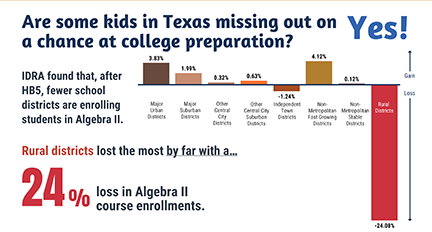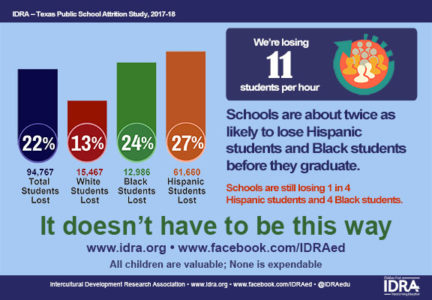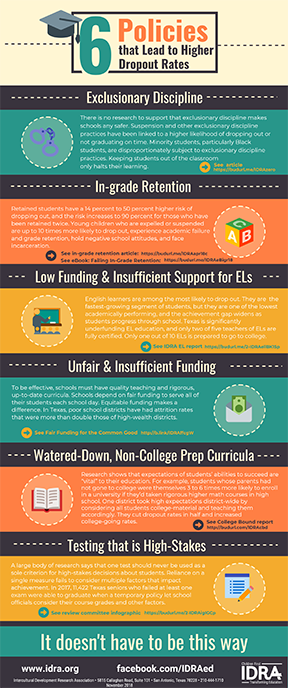All students should be prepared for success in college so they can determine their own futures. Research on the 21st Century workforce indicates most jobs require some level of education beyond high school. Yet students of color and students from families with limited incomes continue to face barriers to rigorous college preparation, access and success.
Many Texas students Face Barriers to Higher Education
Texas students face numerous preparing for and accessing higher education.
 College Preparation Barriers – Black students and Latino students face barriers to college readiness in high school and access to college. They are twice as likely as their White peers to be pushed out of high school without obtaining a diploma due to disproportionate discipline, unfair curricular tracking, and low and inequitable funding (Johnson, 2020).
College Preparation Barriers – Black students and Latino students face barriers to college readiness in high school and access to college. They are twice as likely as their White peers to be pushed out of high school without obtaining a diploma due to disproportionate discipline, unfair curricular tracking, and low and inequitable funding (Johnson, 2020).
Many students also do not have access to the advanced courses they need to enroll in college. In 2013, Texas weakened high school graduation requirements with House Bill 5. Immediately, the percentage of rural Texas students enrolled in Algebra II – a crucial course for college readiness – dropped compared to suburban and urban students (Bojorquez, 2018).
 College Access Barriers – Texas deregulated public university tuition in 2003, which increased already high financial barriers to college, especially for students in families with low incomes and students of color. Policies and practices that overly punish, push out, and track students of color, English learners, and students from families with limited incomes put them at a severe disadvantage for postsecondary readiness, job prospects and lifetime earnings.
College Access Barriers – Texas deregulated public university tuition in 2003, which increased already high financial barriers to college, especially for students in families with low incomes and students of color. Policies and practices that overly punish, push out, and track students of color, English learners, and students from families with limited incomes put them at a severe disadvantage for postsecondary readiness, job prospects and lifetime earnings.
Higher Education Matters for Texas Students
Texas has stagnated in its progress toward the state’s ambitious plan to graduate 60% of the Texas population with a postsecondary credential by 2030, or TX 60×30. For the state to get on track, it must expand opportunities for high school graduation and higher education for students of color, English learners and students from families with limited incomes (IDRA, 2019a, 2019b).
When people have access to higher education, they have better health outcomes, can be more financially stable and are more civically engaged. They also make the state economy more robust with higher earnings and tax contributions.
Everyone benefits from expanding students’ preparation and access to higher education.
Policy Recommendations for Texas
 The Texas Legislature should…
The Texas Legislature should…
- Revise high school graduation pathways and requirements to ensure all students receive rigorous curriculum, including Algebra II, for college readiness.
- Develop data monitoring systems for TEA to collect and report high school endorsement data.
- Promote policies that provide additional supports for counselor-student ratios, counselor compensation and required training.
- Continue to graduate students who prove their well-rounded academic qualifications to independent graduation committees (IGCs).
- Protect funding public colleges and universities and college grant programs, including the TEXAS Grant and Texas Educational Opportunity Grant programs.
- Maintain the Top Ten Percent Plan without changes. The Top Ten Percent Plan enables Texas students graduating in the top 10% of their class to gain automatic admission to public colleges. The plan has increased postsecondary access significantly to Black and Latino students across Texas.
- Protect and expand access to higher education for undocumented and DACA-recipient students by keeping in-state tuition eligibility and increasing their access to state and institutional financial aid.
- Require institutional faculty diversity plans that are connected to funding.
- Allocate federal and state funding for college student emergencies and crises.
- Provide accelerated learning opportunities and other support to ensure that all COVID-19-era students are college-ready.
For more information, contact Dr. Chloe Latham Sikes, IDRA Deputy Director of Policy (chloe.sikes@idra.org) or Ana Ramón, IDRA Deputy Director of Advocacy (ana.ramon@idra.org).
References
Bojorquez, H. (2018). Ready Texas – A Study of the Implementation of HB5 in Texas and Implications for College Readiness. San Antonio, Texas: IDRA. http://www.idra.org/wp-content/uploads/2018/05/Ready-Texas-A-Study-of-the-Implementation-of-HB5-in-Texas-and-Implications-for-College-Readiness-by-IDRA-May-2018.pdf
IDRA. (2019a). Don’t Block Graduation Because of a Test, Policy Brief. San Antonio, Texas: IDRA. https://www.idra.org/wp-content/uploads/2019/03/Policy-Brief-IGCs-IDRA-2019-Mar5.pdf
IDRA. (2019b). Top Ten Percent Plan in Texas, research website. San Antonio, Texas: IDRA. https://www.idra.org/education_policy/top-ten-percent-plan-texas/
Johnson, R. (November-December 2019). Texas Public School Attrition Study Highlights, 2018-19 – Attrition Rate Down to 21%, But Texas High Schools Lost Over 88,000 Students Last Year, IDRA Newsletter. https://idra.news/nlND19c

